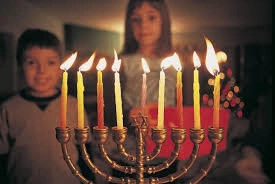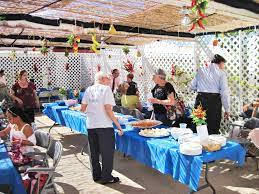Trending For You
Jewish Holidays 5783
 Hanukkah
Hanukkah
Evening of Sunday, December 18 2022 and ends in the evening of Monday, December 26, 2022
Hanukkah (alternately spelled Chanukah), meaning “dedication” in Hebrew, refers to the joyous eight-day celebration during which Jews commemorate the victory of the Maccabees over the armies of Syria in 165 B.C.E. and the subsequent liberation and “rededication” of the Temple in Jerusalem.
The modern home celebration of Hanukkah centers around the lighting of the hanukkiyah, a special menorah for Hanukkah; and preparing food in oil including latkes (potato pancakes) and sufganiyot (jelly doughnuts); and special songs and games.
Tu B’Shevat
Evening of Sunday, February 5, 2023 and ends in the evening of Monday, February 6, 2023
Tu B’Shevat or the “New Year of the Trees” is Jewish Arbor Day. The holiday is observed on the 15th (tu) of the Hebrew month of Sh’vat.
Today, the holiday has become a tree-planting festival in Israel, in which Israelis and Jews around the world plant trees in honor or in memory of loved ones and friends.
Purim
Evening of Monday, March 6, 2023 and ends in the evening of Tuesday, March 7, 2023
Purim is celebrated with a public reading of the Book of Esther (Megillat Esther). The reading of the megillah typically is a rowdy affair, punctuated by booing and noise-making when Haman’s name is read aloud.
Purim is an unusual holiday in many respects. First, Esther is the only biblical book in which God is not mentioned. Second, Purim, like Hanukkah, traditionally is viewed as a minor festival but elevated to a major holiday as a result of the Jewish historical experience.
Over the centuries, Haman became the embodiment of every anti-Semite in every land where Jews were oppressed. The significance of Purim lies not so much in how it began, but in what it has become: a thankful and joyous affirmation of Jewish survival against all odds.
 Passover
Passover
Evening of Wednesday, April 5, 2023 and ends in the evening of Thursday, April 13, 2023
Pesach, known as Passover in English, commemorates the Exodus from Egypt over 3,000 years ago. The ritual observance of this holiday centers around a special home service called the seder (meaning “order”) and a festive meal.
On the fifteenth day of Nisan in the Hebrew calendar, Jews gather with family and friends in the evening to read from a book called the haggadah, meaning “telling,” which contains the order of prayers, rituals, readings and songs for the Passover seder.
Today, the holiday is a celebration of freedom and family.
Yom HaShoah
Evening of Monday, April 17, 2023 and ends in the evening of Tuesday, April 18, 2023
Yom HaShoah, also known as Holocaust Remembrance Day, occurs on the 27th of Nisan.
Shoah, which means catastrophe or utter destruction in Hebrew, refers to the atrocities that were committed against the Jewish people during World War II.
This is a memorial day for those who died in the Shoah.
Yom HaZikaron and Yom Ha’atzmaut
Evening of Monday, April 24, 2023 and ends in the evening of Wednesday April 26, 2023
Four new holidays have been added to the Jewish calendar and become national holidays since the establishment of the State of Israel. Yom HaShoah (Holocaust Remembrance Day), Yom HaZikaron (Memorial Day), Yom HaAtzmaut (Independence Day), and Yom Yerushalayim (Jerusalem Day).
Yom HaAtzmaut, Israeli Independence Day, marks the establishment of the modern state of Israel in 1948. It is observed on or near the 5th of Iyar in the Hebrew calendar, which usually falls in April.
The Israeli Knesset established the day before Yom HaAtzmaut as Yom HaZikaron, a Memorial Day for soldiers who lost their lives fighting in the War of Independence and subsequent battles.
Shavuot
Evening of Thursday, May 25, 2023 and ends in the evening of Saturday, May 27, 2023
Shavuot is the Hebrew word for “weeks” and refers to the Jewish festival marking the giving of the Torah at Mount Sinai.
In ancient times, Shavuot was a pilgrimage during which Israelites brought offerings to the Temple in Jerusalem. Today, it is a celebration of education, actively participating in Jewish life and Torah.
Tisha B’Av
Evening of Wednesday, July 26, 2023 and ends in the evening of Thursday, July 27, 2023
Tisha B’Av (literally, “the 9th of Av”) is one of two major fast days in Judaism, the other being Yom Kippur. It commemorates the destruction of the First and Second Temples and Jerusalem by the Babylonians (586 BCE) and Romans (70 CE). It also commemorates other Jewish tragedies that occurred on the 9th of Av, as well as other catastrophes in Jewish history, including the Holocaust. It is customary to recite the Book of Lamentations (Eicha) and kinnot (liturgical dirges of Jewish tragedies).
5784 Holidays
Rosh Hashanah
Evening of Friday, September 15, 2023 and ends in the evening of Sunday, September 17
Rosh Hashanah (literally, “Head of the Year”) is the Jewish New Year. It is the start of a 10-day period of prayer, self-examination and repentance.
This period, known as the Yamim Noraim (Days of Awe or High Holy Days), is widely observed by Jews throughout the world.
Rosh Hashanah is celebrated on the first day of the Hebrew month of Tishrei, which—because of differences in the solar and lunar calendar—corresponds to September or October on the secular calendar.
Customs associated with the holiday include sounding the shofar, eating a round challah, and tasting apples and honey to represent a sweet New Year.
Yom Kippur
Evening of Sunday, September 24, 2023 and ends in the evening of Monday, September 25, 2023
Yom Kippur means “Day of Atonement” and refers to the annual Jewish observance of fasting, prayer and repentance. Part of the High Holidays, which also includes Rosh Hashanah, Yom Kippur is considered the holiest day on the Jewish calendar.
The Yom Kippur fast is seen as fulfilling the biblical commandment in Leviticus 23:27 and enables us to put aside our physical desires and concentrate on our spiritual needs through prayer, repentance and self-improvement.
Yom Kippur is the moment in Jewish time when we dedicate our mind, body, and soul to reconciliation with God, our fellow human beings, and ourselves. We are commanded to acknowledging our sins and the pain we might have caused and at the same time, we must be willing to forgive and to let go of resentment certain offenses provoked in us. On this journey we are both seekers and givers of pardon.
Only then can we turn to God and ask for forgiveness: “And for all these, God of forgiveness, forgive us, pardon us, and grant us atonement.”
 Sukkot
Sukkot
Evening of Friday, September 29, 2023 and ends in the evening of Friday, October 6, 2023
Sukkot, a Hebrew word meaning “booths” or “huts,” refers to the Jewish festival giving thanks for the fall harvest. It also commemorates the 40 years of Jewish wandering in the desert after the giving of the Torah atop Mt. Sinai.
Sukkot is celebrated five days after Yom Kippur on the 15th of the month of Tishrei. Sukkot (in this case, the plural of sukkah) are commonly used during the seven-day festival for eating, entertaining and even for sleeping.
Sukkot also called Z’man Simchateinu (Season of Our Rejoicing), is the only festival associated with an explicit commandment to rejoice. A final name for Sukkot is Chag HaAsif, (Festival of the Ingathering), representing a time to give thanks for the bounty of the earth during the fall harvest.
Shemini Atzeret – Simchat Torah
Sundown on October 6 – nightfall on October 8, 2023
Immediately following Sukkot, we celebrate Sh’mini Atzeret and Simchat Torah, a fun-filled day when we celebrate the completion of the annual reading of the Torah and affirm the Torah as one of the pillars on which we build our lives.
During the Torah service, the concluding section of the fifth book of the Torah, D’varim (Deuteronomy), is read, and immediately following, the opening section of Genesis, or B’reishit as it is called in Hebrew, is read. This practice represents the cyclical nature of the relationship between the Jewish people and the reading of the Torah.